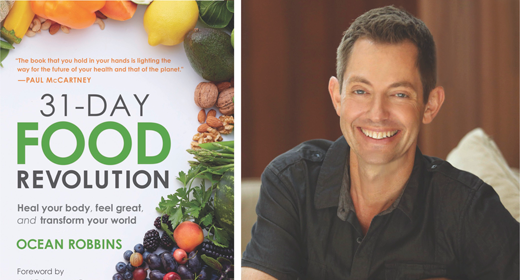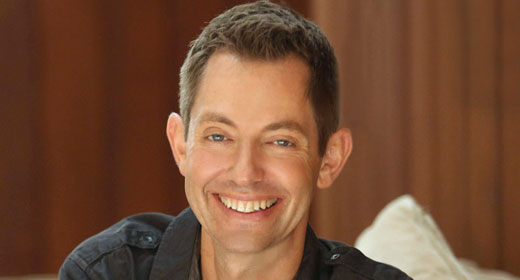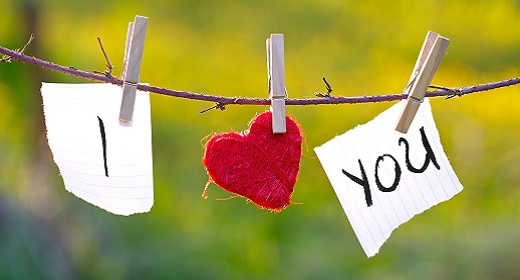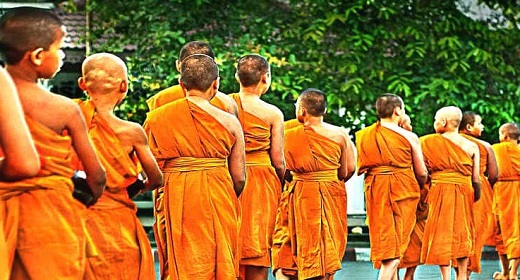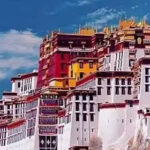Chögyam Trungpa was a Buddhist meditation master and a bright spark within both the Kagyu and Nyingma lineages, and the eleventh Trungpa tülku…
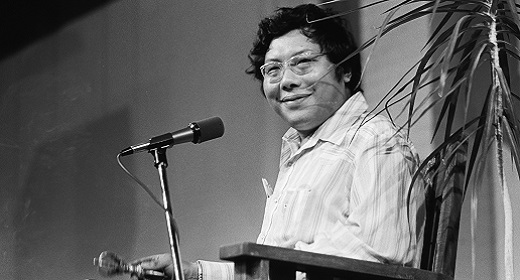
He was born in a remote village in the Himalayas, and recognized by the Trungpa lineage as a Buddhist teacher when he was still an infant. One of his teachers, Khenpo Gangshar was famous for his “crazy wisdom.” This wisdom can be seen in much of the Rinpoche’s commentary and teachings. These form a vast body of study, but if you really want to cut through the spiritual BS and get right down to the truth of the matter, Chögyam Trungpa is your guy. Here are ten quotes that cut to the chase, albeit with eloquent insight.
Let’s Be Real. When We Start Our Paths to Enlightenment, We Aren’t Beautiful, Peaceful or Smart. That’s O.K.
You wouldn’t stay away from a yoga class because you are inflexible, would you? That’s the purpose of the practice – to get unstuck — mentally, physically, and spiritually from the things that keep us ignorant, rude, war-like, selfish, and non-compassionate. If meditation teaches you nothing else, it will teach you to look at yourself honestly. Chögyam Trungpa would say, “We do not have to be ashamed of what we are. As sentient beings we have wonderful backgrounds. These backgrounds may not be particularly enlightened or peaceful or intelligent. Nevertheless, we have soil good enough to cultivate; we can plant anything in it.” If you think you are peaceful, you will see in deep contemplation, that you start wars within yourself, even if you don’t with others, or that you fight against something — even if its the materiality of your own body. If you think you are intelligent, you learn in meditation that you know so little, and there is an epic amount of knowledge and wisdom (not just facts) that you still need to absorb. If you think you are beautiful, and define this only as your physical state, a spiritual path will show you all the places you are ugly, so that your soul can grow in that manure.
You Must Die to Live
“Enlightenment is ego’s ultimate disappointment,” is the way Chögyam Trungpa put it. In Jungian psychology the death of the ego is called a ‘psychic’ death, but it can feel just like a physical death. We cling to our small, subjective self-identity so strongly. As the Tibetan Buddhist masters taught, to become everything, you must first become nothing. And that ain’t easy — but it is possible. When the ego loses its grip on our physical sensations, this is the first step in realizing that we are more than the self that we have imagined. We lose ourselves in earth’s material pleasures, forgetting that they are small in comparison to the Allness of the Universe. When we are finally ready to return to Oneness, the ego may die a little at a time, or all at once, and it can be painful. This psychic transformation; however, removes the shackles of materialism and dualism, and we once again join with Full Awareness.
Meditation is Not Making You a Better Person – It is Revealing the Person You Are
When giving meditation instructions, Chögyam Trungpa would say, “I would like to emphasize that the practice of meditation as it was presented by the Buddha is no more and no less than working with yourself—sitting with yourself, alone, without entertainment, without further feedback and encouragement.” This sitting with yourself reveals who you are. You don’t judge the good thoughts that come up, nor the bad. You just sit and watch. Learn and discover. He would also say, “Meditation is not a matter of trying to achieve ecstasy, spiritual bliss or tranquility, nor is it attempting to be a better person. It is simply the creation of a space in which we are able to expose and undo our neurotic games, our self-deceptions, our hidden fears and hopes.”
Fearlessness Only Arises from True Tenderness
As Chögyam Trungpa would teach, “Real fearlessness is the product of tenderness. It comes from letting the world tickle your heart, your raw and beautiful heart. You are willing to open up, without resistance or shyness, and face the world. You are willing to share your heart with others.”
We Need to See Our Most Undesirable Parts
“Many people try to find a spiritual path where they do not have to face themselves but where they can still liberate themselves–liberate themselves from themselves, in fact. In truth, this is impossible. We cannot do that. We have to be honest with ourselves. We have to see our gut, our real shit, our most undesirable parts. We have to see that. That is the foundation of warriorship and the basis of conquering fear. We have to face our fear; we have to look at it, study it, work with it, and practice meditation with it,” said Chögyam Trungpa.
War Only Arises from Within a Mundane Mind
Tibetan Buddhists have been in their fair share of skirmishes, but this teacher wisely advises, “As long as a person is involved with warfare, trying to defend or attack, then his action is not sacred; it is mundane, dualistic, a battlefield situation.” As Eckhart Tolle would say, “In most cases, when you say “I,” it is the ego speaking, not you. It consists of thought and emotion, of bundles of memories you identify with “me and my story,” of habitual roles you play without knowing it, of collective identifications such as nationality, religion, race, social class, or political allegiance. It also contains personal identification, not only with possessions, but also with opinions, external appearance, long-standing resentments, or concepts of yourself as better than or not as good as others, as a success or failure.” This is the kind of mind that creates war with perceived “others.”
The Ego Will Appropriate Even Spirituality to Save its Own Ass
“No matter what the practice or teaching, ego loves to wait in ambush to appropriate spirituality for its own survival and gain,” taught Chögyam Trungpa. We can see all the ways false gods and gurus, or even our close friends deem themselves “better” or “more enlightened” than others while they are still eons from achieving true compassion, selflessness, or kindness. Beware of the many snares of the ego mind. Its deviousness is hard to deceive by ingenuity alone.
Your Heart Isn’t Really Open Until It Stays Loving While People Are Tormenting You
“When we find ourselves in a situation in which our buttons are being pushed, we can choose to repress or act out, or we can choose to practice. If we can start to do the exchange, breathing in with the intention of keeping our hearts open to the embarrassment or fear or anger that we feel, then to our surprise we find that we are also open to what the other person is feeling. Open heart is open heart.” This is wise advice from a man who certainly had to face fear, anger, and jealousy, just like he rest of us.
Sanity Looks Nothing Like You Thought
This Tibetan master would say, “Delight in itself is the approach of sanity. Delight is to open our eyes to the reality of the situation rather than siding with this or that point of view.” Strangely, when we stop seeing things as we wish they could be, but as they truly are, we experience tremendous freedom. We can choose to work with things as we’ve created them thus far, and stop kidding ourselves about the manifestations that surround us. This freedom creates delight. Think of a toddler playing in a sand box or a dog chasing its own tail. They don’t try to force things into being, they just “play” with things as they are.
Even the Wisest Sage Cannot Teach You Your Truth
Chögyam Trungpa once said in a talk, “There is a saying in the Tibetan scriptures: “Knowledge must be burned, hammered, and beaten like pure gold. Then one can wear it as an ornament.” So when you receive spiritual instruction from the hands of another, you do not take it uncritically, but you burn it, you hammer it, you beat it, until the bright, dignified color of gold appears. Then you craft it into an ornament, whatever design you like, and you put it on.”




